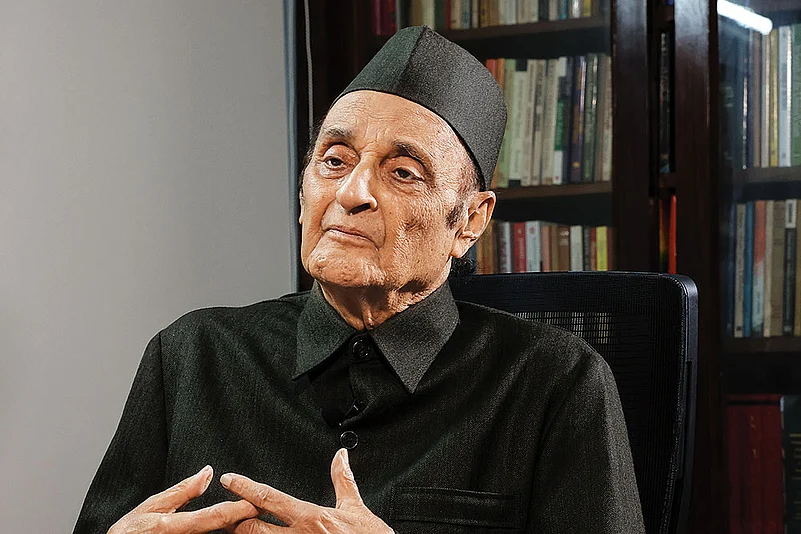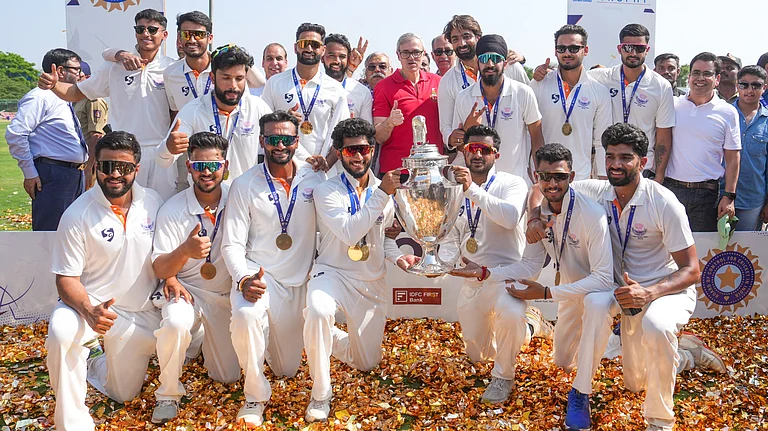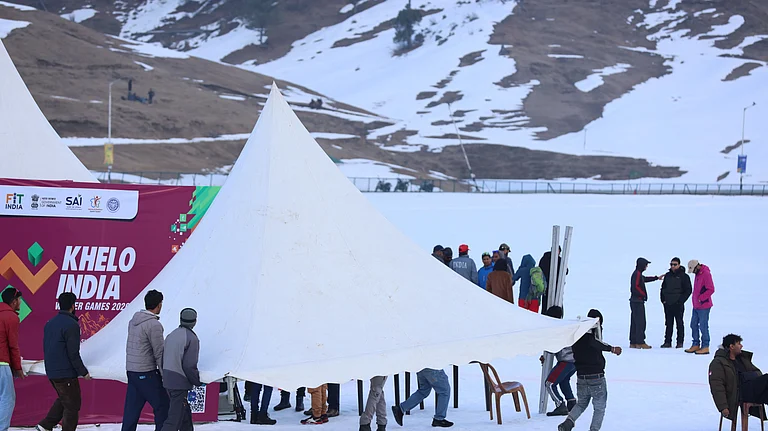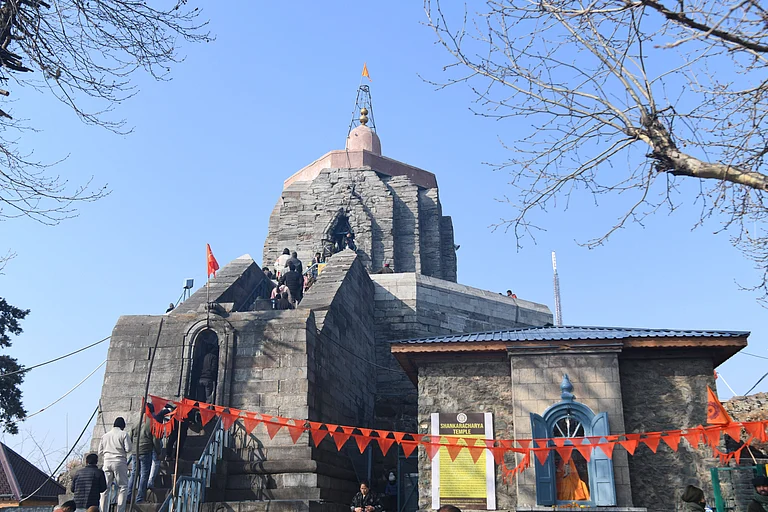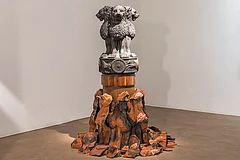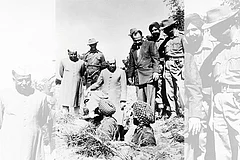Sitting in his palatial mansion in Delhi, Karan Singh, the Titular Maharaja of Jammu and Kashmir, reminisces his days with India’s first Prime Minister, Pandit Jawaharlal Nehru. It’s the same home that Nehru visited for a housewarming party. Singh, now 93, shares memories of an India that Nehru envisaged and recollects the moment when “Pandit ji” inspired him to be a part of the “exciting adventure of building a new India”. In an exclusive interview with Abhik Bhattacharya, he also condemned verbal attacks on Nehru by the ruling dispensation. Excerpts:
You entered public life at the age of 18 and consider Nehru as your mentor. Please share your memories of Nehru.
My impression of him began much earlier when I was still in school. I read his brilliant autobiography The Discovery of India and it mesmerised me. So, even before I met him, I had read about him. I remember the time when Pandit ji first came to meet my father. I couldn’t meet him then. During his next visit, my father walked with him into my room and said, “Tiger is your great admirer”. Since then, Pandit ji has always called me ‘Tiger’. His letters to me used to start with ‘My dear Tiger’. Then I went to America. When I came back due to the evolving circumstantial situations, my father had to leave the state. I was very rigid and went to meet Pandit ji at Teen Murti. He told me: “Tiger, you are a young man and a New India is coming up. Whatever your past might be, look at the future.” This is something that I have always done. I never looked back at the past, either in regret or in anger. From that time onwards, Pandit ji guided me throughout. In his 17-year tenure (as prime minister), he was a towering figure. Modi’s overwhelming presence nowadays is very similar to that of Nehru during those days. After the Partition, the country went through unbearable trauma. With millions of refugees pouring in, Delhi became a refugee camp. Had there been no Nehru and Sardar Patel, Churchill’s prophecy that ‘after we leave, India will break into twenty pieces’ would have come true.
When the Maharaja was asked to leave the state, was Nehru taken on board?
Sardar Patel broke the news to my parents. But Pandit ji was on board. Breaking the news is one thing and making the decision is another. Kashmir was very close to Pandit ji’s heart as it was his ancestry. Let me tell you one thing—it was Sheikh Abdullah who was behind all this. He was calling the shots then.
“Muslims are not a small minority. You can’t leave them. the split in society is not healthy. For the new India that Modi is envisaging, taking people along is essential.”
What do you think of the decision to take the matter of Kashmir to the United Nations?
We could have avoided going to the United Nations. I believe it was Lord Mountbatten who told Pandit ji that ‘you set an example as the leader of the Non-Aligned Movement—it is an open-and-shut case.’ But it was not. When you go, you are bogged down because there are other power politics at play. The result was—we finally ended up agreeing to a plebiscite. Mountbatten said that the people would ascertain their rights. But the first condition was Pakistan had to withdraw its troops from J&K. The Indian army began narrowing out, but Pakistan never did. Who was supposed to win the plebiscite for us? It was Sheikh Abdullah, the tallest leader of the National Conference. He knew Nehru very well. He told Pandit ji that we would never be able to win the plebiscite as long as Maharaja Hari Singh was there and it is very unfortunate. Abdullah was specifically anti-Dogra and had forced them to ask my father to leave. They said it would be for six months. But I brought only his ashes back.
Pandit ji told you that it was the beginning of a New India. The current government also uses the term frequently. But for years, they have been trying to erode Nehru’s legacy…
It is unfortunate that since the BJP came to power ten years ago, there has been a very conscious effort to erode Nehru’s legacy. It is not necessary. You can carry on with your good work. Modi is a very powerful and charismatic figure. Actually, after Nehru, he is the most charismatic leader India has ever got. It is not fair to go back to Nehru. He spent 7-8 years in jail, fought for India’s Independence. You may disagree with him, but to degrade him is not right.
You, as Sadr-e-Riyasat of a Muslim-dominated state like Kashmir, represent the Nehruvian brand of secularism…
... Nehru was not religious at all. He might have been agnostic but not a practising Hindu. During the inauguration of the Somnath Temple, he advised the then President Rajendra Prasad to not attend it. So, his secularism was a sort of socialist secularism. One thing I must point out is that when the Partition happened, a Muslim state was carved out but not a Hindu state. Our constitution makers—a few of them were devout Hindus—were never anti-Muslim. Nehru tried his best to reassure the Muslims that they were safe here.
From a Prime Minister asking the President to not attend the inauguration of the Somnath Temple to a Prime Minister presiding over the consecration ceremony of the Ram Mandir—what do you think about the sea change?
The BJP’s way of looking at religion is very different from that of the Congress. Dr Prasad did attend the ceremony despite Nehru’s advice. Pandit ji thought that the head of the state should not attend a religious function. But it is all changing now. I made a small donation for the temple. I got an invite as well but due to health reasons, I couldn’t travel. I don’t have any negative opinion on the temple. Nehru perhaps wouldn’t have liked it … I must say that I differ with him in the matters of religion.
What do you think about Nehru’s stance on reservation? Recently, PM Modi referred to a letter where Nehru allegedly spoke against it.
As far as I know, he was never anti-reservation. I can’t remember the particular letter but I think his stance was that reservation should not go on forever. Reservation was agreed upon after the Poona Pact. Gandhi ji went on fast unto death.
You signed the proclamation when you were 18 and had been in Kashmir until you decided to join Indira Gandhi’s cabinet. Were you tired of living in Kashmir?
Firstly, the state is not Kashmir, it is Jammu and Kashmir. This is something that the people of Jammu really disapprove of. We founded the state. There was no Kashmir before my ancestor Maharaja Gulab Singh founded Jammu and Kashmir, Gilgit-Baltistan and Ladakh. Earlier, they were never a part of India. It was a great achievement. I got elected as the Governor thrice till 1962. I could have spent the rest of my life there but I wanted to be a part of Nehru’s ‘exciting adventure of building a new India’. As an idealist man, I wanted to be a part of this effort. I wrote in my autobiography that after joining Gandhi’s cabinet, ‘at last, I moved from the crown to the heart of India’.
You said that between Nehru and Modi, there has been a change in the idea of India. Is it for good?
It will be a value judgement. For Hindus, it may be for good. But what I feel is that we should take all communities together. Muslims are not a small minority. You can’t leave them. Before Partition, this is the way things were built up. … the split in society is not healthy. For the new India that Modi is envisaging, taking people along is essential.
So, the aspirations of Modi’s New India should carry the spirit of Nehru’s New India?
MORE FROM THIS ISSUE
You can’t erase history. All the IITs, IIMs, atomic energy—it happened in his time. He almost played the foundational role in every sector. So, Modi’s New India should share the aspirations of Nehru’s New India, instead of denigrating it.
(This appeared in the print as 'You May Disagree With Nehru, But To Degrade Him Is Not Right')







